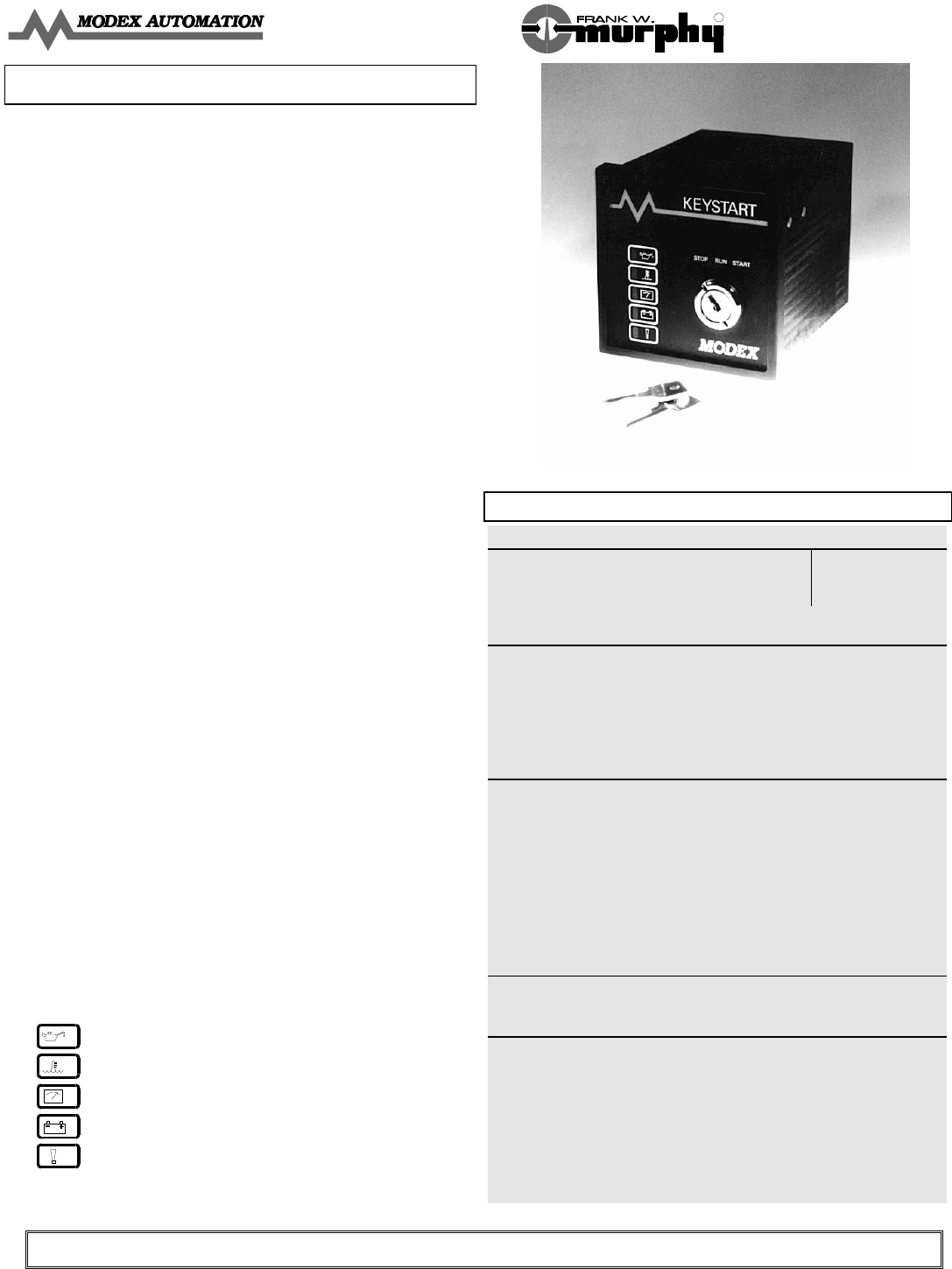
KEYSTART 9700 series
MANUAL START ENGINE CONTROLLER WITH
AUTOMATIC FAULT PROTECTION SHUTDOWN
The Keystart 9700 range provides for the manual starting and
stopping of a standby engine - a generator, pump or other
application - with automatic monitoring and shutdown of the
engine in the event of a fault.
The 9700 series is pin compatible with the Autostart range:
this allows the use of standard wiring for both manual and
automatic control panels, simplifying panel design and
permitting easy upgrades from a manual to fully automatic
control system.
Key features
• Keyswitch operation for enhanced security
• Up to four fault inputs, configurable for use with contacts
which open or close on fault, with wiring to +ve or –ve DC
• Options for overspeed protection (magnetic pickup or
AC alternator driven) and preheat/auxiliary control.
• Pin compatible with Autostart 705, 710, 720 and 730 series.
• 96 x 96mm DIN standard, front panel mounted case
• Switchable 12 or 24 V DC power supply
Operation
The Keystart is powered from the engine battery or similar
low voltage DC source. A switch at the rear allows for 12V
or 24V operation.
Control of the Keystart and engine is by use of a 3 or 4
position keyswitch on the front facia:-
STOP Removes power from the Keystart, stopping the
engine and resetting a latched fault condition.
RUN Energises the Keystart’s RUN relay (enabling
the engine fuel or ignition). The fault ‘override’
timer begins as soon as the key is turned (or
spring returns) to this position. Once the engine
is fully running, Keystart monitors for faults and
shuts down the engine if a fault is detected.
Maintains fuel to the engine, and activates the
START output (used for controlling the starter
motor circuit). This position is spring-biased to
return to the RUN position when the operator
releases the key.
AUX (optional: 'A' models only) Provides a switched
+ve DC output, used for preheat circuits or
auxiliary control (remote power up) of Keystart.
The key is common to all Keystarts and is removable
only in the STOP position.
The front facia also has five LED and pictogram indicators
for the display of engine fault status:-
Low Oil Pressure
High Engine Temperature
Overspeed (or Plant Fail on non-overspeed units)
Charge Fail
Plant Fail
The Generator Controls Division of
M010901
Issue 5, revised 04/99
Catalogue section 75
Product Specifications
Power supply:
Operating voltage:
Steady state
Brown out / cranking
(12V setting)
9 – 20 V DC
<= 5V for 2 secs
(24V setting)
18 – 33 V DC
<= 10V for 2 secs
Current consumption < 150mA
Inputs:
Fault switch inputs:- selectable: open or closed, + ve or – ve
+ ve input defined as:
– ve input defined as:
80% to 100% of +ve DC supply
–1V to +2V w.r.t –ve DC supply
Speed sensing inputs:-
Magnetic pickup
AC alternator
10 – 60 VAC peak, < 2300 to > 3400 Hz.
90 – 350 VAC rms, < 50 to > 60 Hz. nom.
Outputs: (all ratings for resistive load)
Run relay output volt-free SPCO relay contacts
16 A max. @ 24V DC
Start output + ve DC (switched)
16 A max. @ 24V DC
Auxiliary/preheat output + ve DC (switched)
15 A max. @ 24V DC
Alarm output – ve DC (open collector transistor)
300mA max. @ 33V DC max.
Tachometer / calibration To suit 0 – 1 mA, 75 Ohm meter,
output = 0.75mA at rated engine speed
Adjustable settings:
Fault Override timer < 10 to > 30 secs.
Overspeed trip level < 100 to >130 % of calibrated speed
General:
Overall dimensions (w x h x d) 96 x 96 x 130 mm
Panel cut-out size DIN 92 x 92 mm
Weight approx. 500 g
Operating ambient temperature –10
o
C to +55
o
C
Case sealing IP22
Vibration 1G, 50 Hz to 5 kHz.
Chemical/fire case: glass filled Noryl,
self extinguishing, non-dripping.
facia: polycarbonate
In order to consistently bring you the highest quality, full featured products, we reserve the right to change our specifications and designs at any time.
